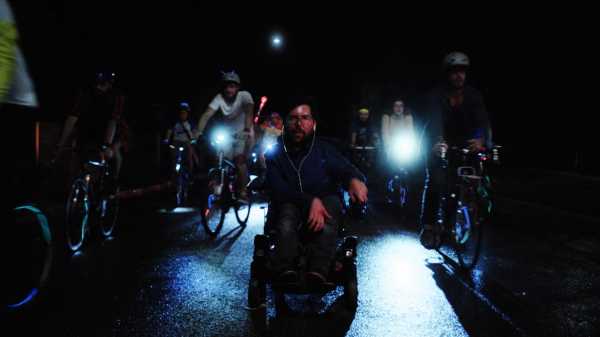
The film’s protagonist, Stuart, longs to be not only independent and self-sufficient but also rich.
In “Act of God,” a short film written and directed by Spencer Cook and Parker Smith, a man named Stuart sees a hundred-dollar bill on a sidewalk during his morning commute. He can’t maneuver his wheelchair to pick up the money, so he continues on to the office. On the way home, Stuart (played with quiet intensity by Cook, who is himself disabled) spots the bill again, and this time he is determined not to give up so easily. It is a breezy night, and a wild chase ensues, Stuart in his wheelchair pursuing his prize as the wind whisks it along the ground, under highway overpasses, and down deserted streets. At one point, he finds a discarded piece of wood with rusty nails sticking out of it, and we are treated to the arresting image of our hero rolling furiously past, jagged stick in hand, like a medieval knight charging into battle.
But the struggle that matters in Stuart’s life isn’t his quest to impale a bit of wayward currency. Rather, it is a type of challenge recognizable to almost anyone: he needs a certain kind of help and has a hard time accepting it. Cook, who lives in Austin, Texas, and is an artist and a disability activist in addition to being a filmmaker, told me in an e-mail that “caregiving is a difficult job, as is accepting that care gracefully.” He would know, as would Smith, who lived with Cook and worked as his caregiver for several years before the two decided to collaborate on a film. “Act of God” grew out of the pair’s “mutual recognition of the strangeness of our life together,” Cook wrote.
The New Yorker Documentary
View the latest or submit your own film.

In the film, Stuart longs to be not only independent and self-sufficient but also rich; a good bit of satirical hay is made out of his habit of listening to a podcast titled “Spirituality for Aspiring C.E.O.s and Entrepreneurs.” (“The external world cannot affect or disturb you,” the podcast host intones, as Stuart, earbuds in place, bumps his wheelchair over debris strewn on the road. “You alone manifest your reality.”) Most of all, Stuart yearns not to have to rely on “them,” as he confides to a co-worker who also uses a wheelchair. Relying on them—people without disabilities—is “just . . . exhausting.”
But Stuart does have to rely on “them”—especially his new caregiver, the bumbling but affable Paul, played with a light comic touch by Tinus Seaux. In an e-mail, Smith said that Paul “is essentially playing an improved version of myself—better hair, cooler glasses, friendlier, more patient.” Whether it is possible—for Stuart and for viewers—to see that relationship as a source of meaning and connection, not merely a necessary arrangement, is the central question of the film. “It’s my belief,” Cook told me, “that the ideals of independence and self-sufficiency are nearly always destructive and delusional. The fact that I rely absolutely on the people around me is simply a bit more obvious.”
In the course of our Q. & A., I asked Cook and Smith what question I should be asking them that I wasn’t thinking of. Cook’s reply was especially illuminating. The question to ask, he wrote, is: “Who pays for Stuart’s (and my) care? And the answer is: Medicaid, the program that many politicians dream of cutting into oblivion. Though it’s certainly not perfect, I wouldn’t be able to live without it. The fact that someone with my disability can live in their community and meaningfully contribute to it is a really beautiful thing that I wish our country were more proud of.”
Sourse: newyorker.com






